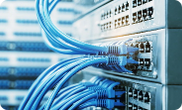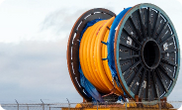WiFi vs. Cableado: ¿Cuál es mejor?

No hace mucho, las conexiones a internet eran todas por cable, pero hoy en día se puede elegir entre wifi y conexiones por cable. Aunque los usuarios puedan pensar que el wifi siempre es mejor solo por ser moderno, no siempre es así, ya que tanto las redes wifi como las por cable tienen sus ventajas y desventajas. Antes de entrar en detalles, entendamos qué entendemos por conexiones por cable y wifi.
Conexión por cable:
Una conexión por cable es una conexión que se logra con la ayuda de los cables Ethernet que se conectan a Internet y transfieren los datos entre varios dispositivos.
Conexión WiFi:
La conexión a internet wifi o inalámbrica funciona mediante radiofrecuencia o una señal de microondas. No se necesita un cable Ethernet para conectarse a internet. La conexión se gestiona mediante un router inalámbrico conectado al módem de internet.
WiFi vs. Cableado: ¿Cómo se comparan?
Para ilustrar cómo se compara WiFi con las redes cableadas, comparemos varios factores de rendimiento en detalle.
Transmisión
Como sugiere la definición, una red cableada utiliza cables para conectar dispositivos a internet. En cambio, en una red inalámbrica, los dispositivos se conectan mediante un punto de acceso inalámbrico.
Movilidad
Las conexiones wifi superan a las redes cableadas en cuanto a movilidad. Puedes usar los dispositivos conectados a las redes wifi en cualquier lugar donde haya señal. Con una red cableada, necesitarás un cable adicional para conectar un segundo dispositivo a internet, lo cual resulta incómodo.
Velocidad
En general, las redes cableadas son siempre más rápidas que las inalámbricas debido al acceso directo a la red que proporciona el cable. A diferencia de las redes cableadas, las conexiones wifi también sufren interferencias de señal.
Además, las conexiones wifi son propensas a las llamadas zonas muertas, que son las áreas de la casa que no tienen cobertura de la red inalámbrica, aunque deberían tenerla. En las redes cableadas no existen zonas muertas, ya que todos los dispositivos están conectados directamente a la red Ethernet.
Con el cable Cat6, la conexión por cable puede alcanzar velocidades de hasta 10 Gbps, algo imposible de alcanzar con la red wifi. Sin embargo, la velocidad de las redes wifi ha aumentado significativamente en los últimos años, y la conexión wifi es suficiente para la mayoría de las tareas diarias.
La velocidad promedio de carga/descarga de la red cableada es de 60 Mbps/30 Mbps, mientras que la velocidad promedio de carga/descarga de la red WiFi es de 20 Mbps/15 Mbps.
Seguridad
Las redes cableadas se consideran más seguras porque el acceso requiere acceso físico al cable. Con las redes inalámbricas, una persona fuera de su apartamento o edificio de oficinas, en teoría, puede acceder a su red.
Sin embargo, las redes cableadas también requieren firewalls y aplicaciones de seguridad completamente ignífugas. Asimismo, las redes inalámbricas pueden ser totalmente seguras con las configuraciones y los sistemas de seguridad de red adecuados. Las tecnologías de cifrado como WEP y WPA2 pueden proteger las redes inalámbricas de intrusiones.
Ancho de banda
El internet por cable ofrece un ancho de banda mucho mejor que las redes wifi. Esto se debe a que los datos se transmiten directamente cuando los dispositivos se conectan mediante un cable Ethernet. Con wifi, se espera cierta pérdida de señal cuando esta viaja por el aire de un punto a otro.
Estado latente
La calidad de la conexión se determina no solo por la velocidad o el ancho de banda, sino también por la latencia. La latencia se define como el retraso que tarda el tráfico en llegar al dispositivo desde un destino. Las conexiones por cable son mucho mejores que las inalámbricas para evitar la latencia.
¿Debería elegir Internet cableado o inalámbrico?
Cuando se trata de Wifi vs. cableado, no hay un ganador real entre los dos, por lo que la elección depende de usted en función de sus preferencias específicas.
Si eres un usuario ocasional de internet que valora la comodidad y usas varios dispositivos, incluyendo un smartphone y dispositivos inalámbricos inteligentes para el hogar, como un robot aspirador, el wifi es la mejor opción. Esto también aplica si tienes dispositivos inteligentes, como el IoT, como televisores o relojes inteligentes.
Una conexión por cable es la mejor opción si eres gamer, haces streaming desde tu PC o usas una sola PC de escritorio con todo lo necesario en un solo lugar. También deberías considerar instalar una conexión Ethernet si envías constantemente archivos grandes por...
Internet.
Cables para Internet por cable
Si opta por una conexión por cable, los cables típicos son el par trenzado sin blindaje (UTP), el par trenzado blindado (STP) , el cable coaxial y el cable de fibra óptica . Los cables de par trenzado son los más comunes en el hogar, seguidos del cable coaxial. Sin embargo, los cables de fibra óptica son cada vez más populares gracias a su velocidad y rendimiento, aunque son significativamente más caros que el resto. Nassau National Cable ofrece todos estos cables a algunos de los mejores precios del sector y cuenta con una amplia gama de productos.
Cables para un enrutador Wi-Fi
Un router wifi aún necesita cables para conectarlo a un módem o a una puerta de enlace inalámbrica a internet en tu hogar. Los cables más comunes para este propósito son CAT5e, CAT6 y el cable de nueva generación, CAT7. Algunas redes domésticas modernas funcionan con cables de fibra óptica. Puedes consultar la gama completa de cables para computadoras y comunicación de datos que ofrece Nassau National Cable aquí .


















